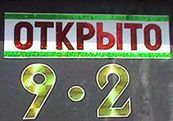 FR FR |
About us | Home | User agreement | Link to us |
The Past Tense in Russian
The Russian past tense is used to talk about actions and situations which took place at any point in the past. It is the most common form of the verb in Russian. The good news is that there is only one past tense form in Russian compared to numerous forms in English.
| She ate. She did eat. She had eaten. She was eating. She has eaten. |
} | Она ела/съела. |
How to form the past tense
Combining the stem of the infinitive with the suffix л forms the past tense verb in Russian. You can then add the past tense verb to the subject of the sentence. For example:
- быть + л --> был (to be - was)
- плавать + л --> плавал (to swim - swam)
- Я был в парке. (I was at the park.)
- Я плавал. (I swam.)
| Remember: Use the same vowel in the past tense verb form as in the infinitive form before -ть. For example, зависеть - зависел, бросить - бросил, спрятать - спрятал. |
There is an exception in forming the past tense form for some Russian verbs which have the infinitive ending in -чь, -ти, -нуть. The suffix л is not used to form the past tense form of such verbs if they are used with singular masculine subjects (i.e. nouns and pronouns), like in:
- беречь --> мальчик берёг (to keep - a boy kept)
- сохнуть --> он сох (to dry - he was drying)
However, the suffix л is used for the same verbs if they are used with singular feminine and neutral, as well as all plural subjects. For example:
- беречь --> она берегла, оно берегло, они берегли
- сохнуть --> она сохла, оно сохло, они сохли
Changes by gender and number
In Russian, all past tense verbs change by number. The ending -и is an indicator of plural number (писал --> писали). It is the same for all genders.
Only singular forms of the past tense verbs change by gender. Singular masculine forms have no ending after the suffix л (туман упал). An indicator of singular feminine forms is the ending а (роса упала). The ending o is used with singular neuter forms (дерево упалo).
The following the table shows the endings that you need to use after the suffix л to form the masculine, feminine, neutre and plural forms of the verb.
| Gender and number |
Past tense ending (after the suffix л) |
Examples (читать - to read) |
| Singular masculine | none | Он читал. | Singular feminine | -a | Она читала. |
| Singular neuter | -o | Оно читало. |
| Plural (all genders) | -и | Они читали. |
Test yourself
Exercise 1
Fill in the blanks with the appropriate past tense form of the verbs given in the brackets.
- 1. Папа ________ вазу яблоками (наполнить).
- 2. Солнце ________ площадь (осветить).
- 3. Девочка ________ домой (спешить).
- 4. Садовник ________ за клумбой (ухаживать).
Exercise 2
Form questions using the Russian words below. Then form either a positive or a negative answer to your questions.
- A. Выучить, уроки, Аня.
- B. Том, опоздать, поезд.
- C. Быть, охотник, Сэм.
- D. Собака, любить, хозяин.
Check answers
- 1. Папа наполнил вазу яблоками.
- 2. Солнце осветило площадь.
- 3. Девочка спешила домой.
- 4. Садовник ухаживал за клумбой.
- A. Аня выучила уроки? Да, выучила. / Нет, не выучила.
- B. Том опоздал на поезд? Да, опоздал. / Нет, не опоздал.
- C. Сэм был охотником? Да, был. / Нет, не был.
- D. Собака любила хозяина? Да, любила. / Нет, не любила.
Related Lessons
Got questions?
Ask them in the Russian Questions and Answers — a place for students, teachers and native Russian speakers to discuss Russian grammar, vocabulary, pronunciation, and other aspects of the Russian language.
Copyright 2001-2026 MasterRussian.com | Privacy Policy | Contact Us
 Russian Lessons
Russian Lessons
- Russian alphabet
- Names of letters
- Russian Q&A new
- Pronunciation: Cons.
- Pronunciation: Vowels
- Noun Gender/Number
- Cases of Nouns
- Russian Greetings
- Personal Pronouns
- Learning Russian
- 1000 Common Words
- 500 Russian Verbs
- Top Russian Nouns
- » All lessons
- » Guest lessons
 Browse Topics
Browse Topics
- Start learning Russian
- Forum
- Bookstore
- Dictionaries
- Russian - basic
- Russian - adv
- Pronunciation
- Russian Blog new
- Reading
- Test & quizzes
- Translation
- Verbs
- Verb Conjugations
- Russian numbers
- Russian Tests new
- Vocabulary
- Writing
- Folk music
- Fun stuff
- Leo Tolstoy
- Learner's lore
- Literature
- Personal blogs
- Picture Dictionary new
- Proverbs
- Publications
- Radio & TV
- Russian culture
- Schools in Russia
- Russian Words
- Russian names
- Software
- Russian Words iPhone
Clicks the "Like" button below to get daily updates on Facebook!
Click "Add to circles" to learn Russian on Google+

Search MasterRussian

English » Russian dictionary

WORD OF THE DAY
![]() RSS
|
iGoogle
|
My Yahoo!
RSS
|
iGoogle
|
My Yahoo!
Meaning: case, event, accident
Pronunciation: [SLOO-chiy]
Learn Russian words! »
TODAY'S STREET SIGN

Russian: Открыто
English: Open
FOLLOW US ON TWITTER

MasterRussian on Twitter


